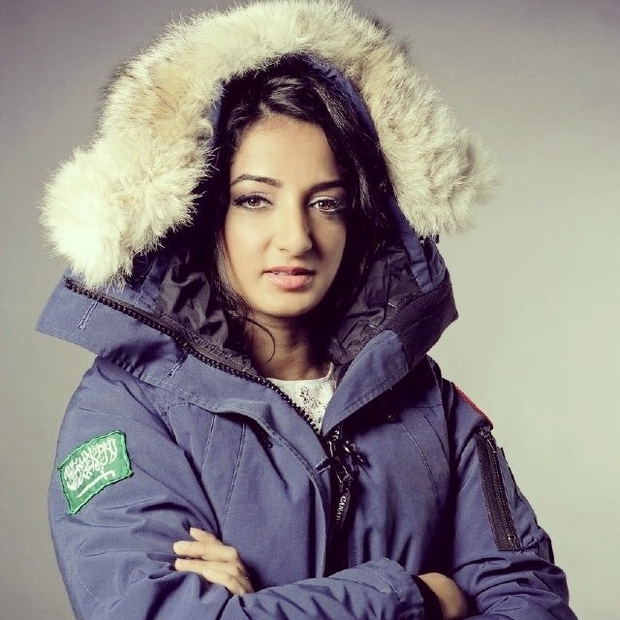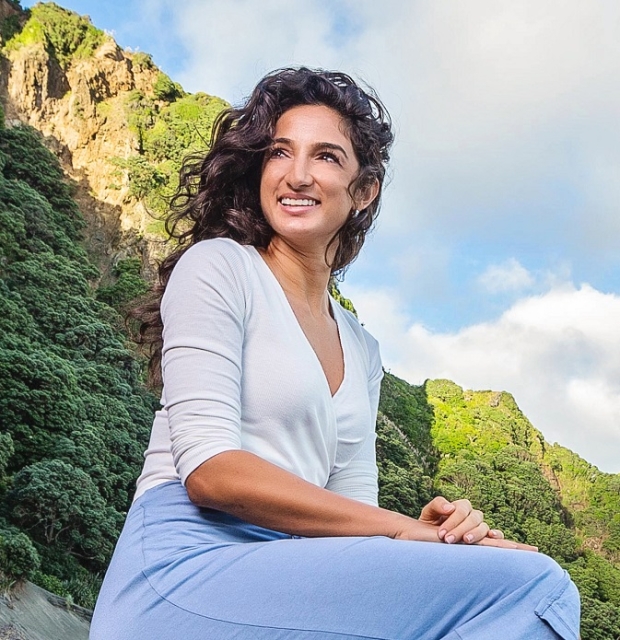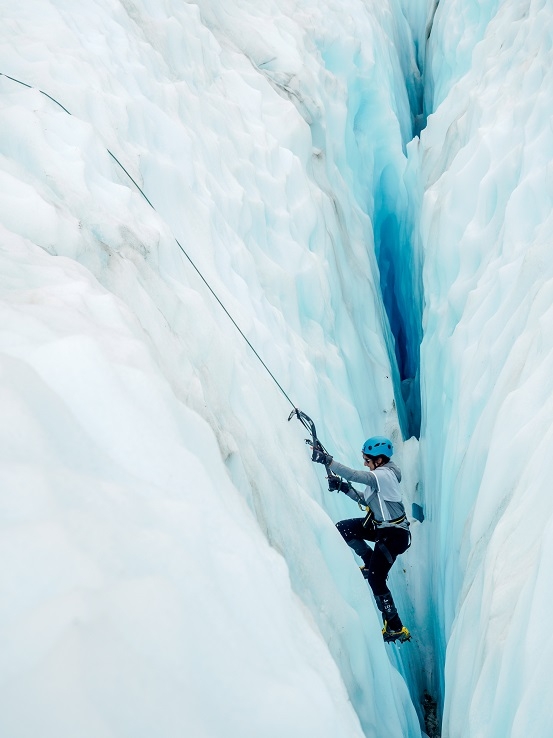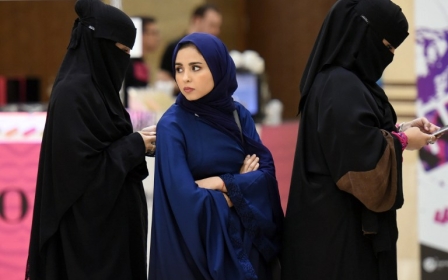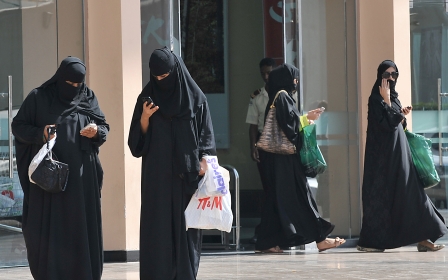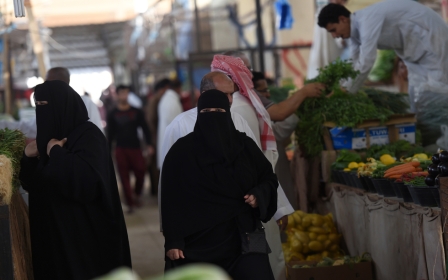On breaking free: A Saudi woman on top of the world
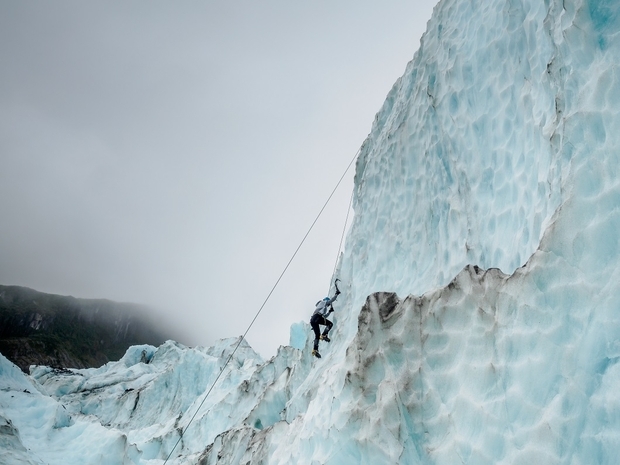
DHAHRAN, Saudi Arabia – At 17,000 feet on Mount Denali in Alaska, Raha Moharrak was close to fulfilling her dream of becoming the first Saudi woman to reach the summit of North America's tallest peak, when bad weather struck. She and her team were trapped amid strong winds, freezing temperatures and difficult crevasses, and had a narrow escape from an avalanche.
“It was a tough mountain, the weather was bad and I nearly died. It took me a year to overcome the emotionally wrecking effects of that expedition,” she says of the 2015 climb.
The difficulties she and her team faced on the Denali climb were formidable and being trapped for a week amplified her already existing claustrophobia.
'It was a tough mountain, the weather was bad and I nearly died'
She also developed rashes, stomach ulcers, lost all of her toenails and felt her life in danger several times a day.
It was one of toughest tests the 31-year-old Saudi, who now lives in Dubai, had faced in breaking through physical, mental and social obstacles to realise her dream to climb the world's tallest peaks, including Mount Everest.
“I am living proof that you can achieve whatever you set your heart to. Who would have thought that a Saudi woman could stand on top of the world?”
Subject to finding a sponsor, Moharrak intends to attempt to climb Mount Denali for the second time, in the summer of this year.
Denali was the last of the so-called seven summits on seven continents Moharrak has yet to climb, having already climbed Kilimanjaro, Everest, Vinson, Elbrus, Puncak Jaya and Aconcagua.
"There were times when I didn’t know what I was doing, there were times when I thought to myself, would it be easier if I was less different? Would it be easier if I was not a Saudi?”
'There were times when I thought to myself, would it be easier if I was less different? Would it be easier if I was not a Saudi?'
“The need to prove myself and realise my dream was much stronger than the need to give up,” she added.
Childhood
Moharrak describes herself as a bold, outgoing, rebellious and brave child. To her parents and many around her, it was clear right from the outset that she was different from her peers. In her quest to achieve her dreams, Moharrak has shattered stereotypes about Saudi women.
In 2008, after graduating with a degree in graphic design and pursuing a three-year career at a design firm in Dubai, Moharrak came to a crossroads when her family asked her to move back to the Saudi kingdom.
“I was never out there to break stereotypes, I was only there to break a stereotype about me,” she explained.
“Why should we live our lives based on social expectations?" she added.
'I was never out there to break stereotypes, I was only there to break a stereotype about me'
Although she was not against the idea of marriage, waiting for a husband and life to “start” was an idea that Moharrak simply could not fathom.
“Who doesn’t want Prince Charming? I am not saying that I don’t want these things, but I don’t think I should wait for him. To me, this concept was just so ridiculous,” she added.
Moharrak admits that her move back to Saudi Arabia in 2011 was a “disaster”. During her life in Dubai, she had become accustomed to an active and athletic lifestyle, playing squash and volleyball. In coming to her homeland where access to sports and outdoor activities are very limited, she felt like a misfit in her own country.
How it started
Her remarkable journey began one day during a conversation she was having with a friend. The words “mountain climbing” came up, and suddenly her interest was piqued; what better way to combine her love for travel and adventure?
Not knowing the faintest thing about mountaineering, Moharrak nevertheless hung on to this idea. When her ambitious plans were shared among friends, they did not believe she was serious.
“You can’t just wake up one day and decide to climb mountains,” one said, but she was not deterred.
Others simply did not understand why embarking on such a feat would even be enjoyable. “Why would you even want to do that?” she recalls another saying.
These remarks only added further impetus to Moharrak to realise her dreams.
“Doing this is important to me and I want to do it for myself. No one can dictate what I am capable of, and what I can or cannot do,” she said.
'No one can dictate what I am capable of, and what I can or cannot do'
Moharrak gives credit to her family for never seeking to change her inquisitive and adventurous ways, although they did initially challenge her when it came to climbing mountains. Moharrak said she then turned to her father's own teachings to convince him that she should climb her first mountain, Mount Kilimanjaro. In a long and impassioned email, she went into great detail of why she had to pursue mountain climbing.
“I wrote to him saying that you are the one who instilled the value of invincibility in me. You taught me how to believe in myself, my dreams and my capabilities," she said. “So, how can you tell me to do something other than what I have grown up to believe?”
After a few months of Moharrak nudging her parents, she finally convinced them of her unwavering determination to climb Mount Kilimanjaro.
'I tried to follow norms, but at some point or other, you break free'
“It took me some time; it seemed like I was chipping away on social expectations. I didn’t want to tie up my hair, I wanted to let it loose and free. I didn’t want to wear a skirt, I wanted to wear pants. I tried to follow norms, but at some or other point, you break free," she said.
“You become this person, slowly.
“My parents have seen it all... I’ve gone scuba-diving, sky-diving, they’ve seen me in stitches and they have seen me in the ER. So basically, this is what I have been doing my entire life, chipping away,” Moharrak added.
Support and criticism
Even though her parents were unsure of what to expect, they have been a constant source of support throughout her journey.
'I didn’t want to tie up my hair, I wanted to let it loose and free'
“They were worried about everything, the cultural aspects, my safety…they just had no idea what to expect!”
Among others, reactions have been very mixed. Friends who knew Moharrak well were not really surprised when she chose her extraordinary path, but others judged her harshly.
“And there were some others who just didn’t get it. They said I shamed the family,” she said, while others responded by saying, “Why can’t you be like other girls? Why do you have to be different?”
Moharrak’s rise to the top
Despite the resistance, Moharrak achieved her long-sought goal and climbed the summit of Mount Kilimanjaro in December 2011, in an expedition she financed with her own money. Moharrak self-trained through the months of October and November 2011 in preparation for the climb, building stamina, strengthening her core and undergoing endurance training.
As well as physical training, she researched mountaineering online to make sure she did everything in her capacity to ensure both body and mind were prepared for the expedition.
Moharrak climbed the peak along with eight other people in an adventure that took seven days. Employing the services of a local alpine climbing company, it became clear as she made the ascent that it was even harder than she anticipated. The financial cost - several thousand dollars - was the least of it.
“I had zero experience in mountain climbing; the experience was emotionally and physically difficult,” she said, adding that it was gruelling, painful, and uncomfortable.
'Why can’t you be like other girls? Why do you have to be different?'
Coming from a country like Saudi Arabia, the toughest part of the expedition was the acclimatisation to the severe cold. She almost died, she said, suffering severe hypothermia as her core temperature fell below the minimum for normal metabolism.
“It was my first time experiencing negative temperatures, and the extreme cold was a shock."
Due to extreme temperatures, the water in her eyes froze, leaving her with fuzzy vision and unable to see the path ahead. To lead her through the last leg of the climb, she relied on a train of team members. When she finally made it to the last few metres, she could feel the sun melting the ice in her eyes.
As she reached the summit, she regained focus and was overcome by euphoria as a spectacular view opened up amidst the clouds on the highest peak of Africa.
“When I reached the top, I knew it was not going to be the last time that I’d climb a mountain. It was infatuation; I knew I was destined to climb mountains.”
Having proved that she could conquer Kilimanjaro, Moharrak was unstoppable: she climbed eight mountains within a span of 12 months. Her defining moment came in 2013 when she made history as the first Saudi woman and youngest Arab to scale Mount Everest.
Message to Saudi women
Moharrak hopes her story inspires women to achieve their calling and rethink the notion that Saudi women are oppressed.
Moharrak urges young people, especially those coming from this part of the world, to follow their passions and unearth the capabilities within them.
“Things are changing, but not fast enough,” she said.
Moharrak is also working on her book, which “is not only about climbing mountains, but how, despite the odds and being a Saudi woman, I have achieved my dreams.”
Her parents are proud of their daughter’s achievements and now expect that anything is possible from Moharrak.
As an advocate of gender equality, Moharrak uses every opportunity to promote the message of women's participation in sports.
She believes it is important to educate girls to believe that they are not less than boys.
"My contribution to the society is something that is easy, but I hope to leave a legacy that shows how attainable our dreams are if we are brave enough to reach for them."
“It is a simple task to climb mountains, but a difficult one to change mentalities,” Moharrak concludes.
"It is a personal dream to live long enough to see a generation where there are no longer any firsts; because all of the firsts with regards to Arab women have been conquered."
This article is available in French on Middle East Eye French edition.
New MEE newsletter: Jerusalem Dispatch
Sign up to get the latest insights and analysis on Israel-Palestine, alongside Turkey Unpacked and other MEE newsletters
Middle East Eye delivers independent and unrivalled coverage and analysis of the Middle East, North Africa and beyond. To learn more about republishing this content and the associated fees, please fill out this form. More about MEE can be found here.


